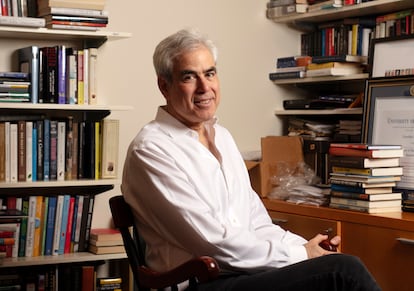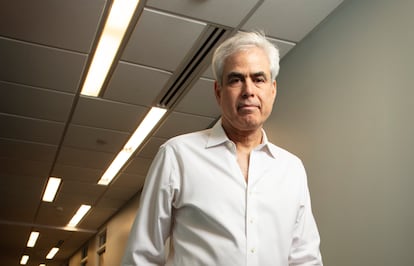Jonathan Haidt: ‘If companies were to do the right thing, they would lose the most valuable customers on earth, preteen kids’
The renowned social psychologist’s new book ‘The Anxious Generation’ is topping US sales charts. The NYU professor believes that people are fed up with social media and are looking for a way out

The latest book by Jonathan Haidt is turning out to be quite a success. He has hit on one of today’s most pressing concerns. The Anxious Generation: How the Great Rewiring of Childhood is Causing an Epidemic of Mental Illness, released in the United States on March 26, topped The New York Times nonfiction best-seller list for four consecutive weeks. Demand has been so high that many points of sale have run out of stock. Haidt, who received his B. A. in philosophy from Yale University and holds a PhD in psychology from the University of Pennsylvania, was recognized as one of the 65 World Thinkers of 2013 by Britain’s prestigious Prospect magazine and as one of the 100 most influential people in business ethics by Ethisphere, a global organization dedicated to promoting ethical practices in corporate environments.
The interview takes place inside his office at New York University’s Stern School of Business, where he has been a professor of ethical leadership for 11 years. It feels as welcoming as an invitation into his own home — Haidt is friendly and offers a cup of coffee that he has prepared himself. Of Jewish descent, Haidt describes himself as a secular liberal. Our conversation revolves around the theory he defends in his book, that in almost every developed country children and young people are suffering from an increase in poor mental health due to their exposure to social media. It is supported by data such as the U.S. National Survey on Drug Use and Health, which indicates that anxiety levels in teenage boys have increased by 161% and in girls by 145% since 2010. For Haidt, responsibility for this mental health epidemic lies with both tech companies and governments.
Question. You already suspected the consequences that overexposure to social media would have on youth. What was the main revelation for you as you conducted your research?
Answer. I think the biggest revelation was when we discovered that it’s not just the U.S., that the same thing was happening at the same time in all of the English-speaking countries, and also in Nordic countries and parts of Europe. I also found it interesting to discover that depression and anxiety affect children and young people who come from secular families more than religious families and from liberal families more than conservative families. Kids who are deeply rooted in local communities and moral responsibilities and duties and religion and family, all these things offer some protection.
Q. One of the principles of psychology is that correlation is not the same as causation. Detractors say that there is no scientific evidence to justify that social media is causing mental problems.
A. A lot of research has been done and there is plenty of evidence. In my book I list dozens of correlational and longitudinal studies that reveal a fairly consistent relationship in which frequent social media users have a much higher risk of mental illness than others. For example, a 2018 study of 14-year-olds found that girls who spend five or more hours a day on social media are three times more likely to be depressed than girls who barely use it.
Q. Mark Zuckerberg continues to deny that evidence. You have met him personally, did any positive changes occur after those meetings?
A. As a result of our research we found that, at 11 years old, the age of maximum vulnerability, many children begin to use Instagram, a very dangerous platform. So I had dinner with Zuckerberg in 2019 and 2020 to discuss how to control the issue of underage users of social media. But I can’t say I’ve noticed any significant changes since then. Meta has shown consistently that when faced with evidence of harm, they will do nothing beyond cosmetic gestures that don’t reduce their user base. If tech companies were to do the right thing, they would lose the most valuable customers on earth, preteen kids.
Q. Zuckerberg has children. Do you think he will be able to protect them from what he himself is allowing?
A. Most of the tech people don’t give their kids the technology. The people who created this stuff know what it does, and therefore they don’t give it to their kids, most of them. And many of them send their kids to Waldorf schools, which use no technology at all, no computers at all.
Q. You have directly pointed at META as being responsible for the suicide of some preteens. Are parents as responsible as technology companies?
A. If the same thing is happening all over the world at the same time, I don’t believe it’s because parents suddenly got irresponsible at the same time. Social media is much more addictive than heroin or cigarettes because it’s socially addictive. Everyone has to be on it because everyone else is on it.
Q. Have we hit rock bottom or could it get worse?
A. If we do not start acting urgently, although the situation is already serious, it can undoubtedly worsen. Right now, it’s only 30% or 40% of kids who are anxious and depressed. It could go to 70%, it could go to 90%. We don’t know what the limit is. Also, Gen Z is now 28, which means they are now having children, which means that for the first time, children are being born to people who never had a healthy childhood. So I’m hopeful that grandparents will play a much larger role because grandparents have the cultural memory of human childhood.

Q. According to your research, if a minor is exposed to social media, they suffer a very high risk of having mental health problems, but if their parents prohibit the use of social media they will be socially isolated, which can also lead to psychological problems. Is there a way out?
A. There is if we act collectively. I recommend that parents agree with two or three other families to act as a group. This is what happened in England, for example. Parents began joining a WhatsApp group that became popular when The Guardian published an article about what was beginning to be a movement. And that had an impact on the government to mobilize: in February it became official that they would prohibit the use of mobile phones in educational centers. People are fed up with social media and are looking for a way out. Those on the left and those on the right. Even the children themselves are seeking help to get out of the addiction that has them hooked, but they cannot do it alone. I think we will get there, it’s just a matter of time.
Q. In your book you dedicate an entire chapter to the case of girls and preteens. Why are they particularly harmed by social media?
A. To begin with, because they use it more. On the other hand, there are differences in how boys and girls interact socially: boys tend to participate in group activities, while girls are more oriented towards one-on-one, face-to-face talking. And what they’re most interested in talking about is other kids in their class and the relationships among them.
Q. The graphs included in your study reflect a change from 2010. What happened then?
A. At first social media were aimed at connecting people, but starting in 2009 they changed their premise and focused on performance. It was when Facebook introduced the “like” and Twitter introduced retweets. The front-facing camera was also introduced which welcomed selfies. Now content creation, beauty, cruelty are rewarded. And this has triggered depression and anxiety in almost all developed countries.
Q. In addition to triggering depression and anxiety, are there other consequences?
A. There are countries where the data related to the increase in mental illnesses in children associated with social media is not conclusive, but there are more damages associated with the telephone that affect children: lack of attention, addiction, decline in social skills...
Q. You point out that parents overprotect children from reality but not from the internet.
A. Exactly. Parents are afraid that their children will talk to dangerous strangers or expose themselves to inconvenient situations on the street, when in reality those undesirable people and situations are on the internet. And they allow them to navigate without restrictions.
Q. And speaking of the lack of restrictions... What do you think of the influencers who use their children on social media as a source of income?
A. Parents who are using their children and creating a permanent record that is likely to embarrass those kids for the rest of their lives, shows the depths of depravity that the lust for prestige brings out in people. I’m not calling for laws to restrain adults. I don’t think about the point where there should be regulation of adults using social media. But I think we need to realize that children are different from adults. They need protection. This is where our children live, in these companies. Yet these companies have no incentive to protect our children. In fact, they have a motivation to exploit them because the children are not the customers, they’re the product. This has to change. For this, we do need government help.

Q. A large part of the U.S. Senate supports the Kids Online Safety Act, KOSA, which aims to protect children by censoring potentially dangerous online content. Would that be a possible solution to the problem?
A. That might pass this year. And that would mandate a duty of care. Not only protecting them from certain content, but also preventing any child under 13 from having access to social media by implementing a user age verification system.
Q. What are the most immediate actions that parents can take?
A. My book is full of suggestions, but I consider there are four fundamental ones: do not allow children to use smartphones before high school, nor access social media before they are 16 years old. Let them study in schools where the use of phones is not allowed and let them play more independently, without constant supervision.
Q. Related to this last point, in 2017 you co-founded the NGO Let Grow to promote the independence of children.
A. Yes, this is a project in which we offer resources to help children be more independent, since we believe that they are currently educated in overprotection. An eight-year-old child can go to school alone, and an 11-year-old child is already capable of taking care of another minor. The ideal is for an entire school to join the project, for it to be a collective action; only then will parents lose their fear. Children choose an activity to do alone (go to the supermarket, do the laundry, prepare dinner...) and in the neighborhood where these children live it will begin to become normal for them to perform these tasks independently. Please note that in some states in North America, parents can be reported if a child is playing alone in their yard. But allowing children to act independently is not negligence. And showing children that they can do it makes them gain self-confidence, which makes them more confident and happy adults.
Q. Being Jewish, it would be interesting to know your opinion on the conflict in the Middle East. On October 8, you publicly showed support for Israel through a tweet. Do you still maintain this support?
A. I don’t want to talk about the Middle East, but I am happy to talk about what is happening on university campuses. The fact that we saw pro-Hamas rallies the day after the attacks indicates a level of radicalization around identity. I certainly understand people who are pro-Palestine and anti-Israel, but to have protests supporting Hamas and to have so many antisemitic acts taking place within that first week... Something is happening on elite college campuses where for the first time we’re now seeing open antisemitism. Universities are hypocritical in saying nothing about that while punishing microaggressions for anything else. That’s my concern, hypocrisy.
Q. The elections are approaching, what worries you most about the future in the United States?
A. That our diminished trust in institutions and in others will make us become ungovernable. If something doesn’t change soon, we will see more chaos, more contested elections, and more political violence, especially if the results of the upcoming presidential election are contested.
Sign up for our weekly newsletter to get more English-language news coverage from EL PAÍS USA Edition
Tu suscripción se está usando en otro dispositivo
¿Quieres añadir otro usuario a tu suscripción?
Si continúas leyendo en este dispositivo, no se podrá leer en el otro.
FlechaTu suscripción se está usando en otro dispositivo y solo puedes acceder a EL PAÍS desde un dispositivo a la vez.
Si quieres compartir tu cuenta, cambia tu suscripción a la modalidad Premium, así podrás añadir otro usuario. Cada uno accederá con su propia cuenta de email, lo que os permitirá personalizar vuestra experiencia en EL PAÍS.
¿Tienes una suscripción de empresa? Accede aquí para contratar más cuentas.
En el caso de no saber quién está usando tu cuenta, te recomendamos cambiar tu contraseña aquí.
Si decides continuar compartiendo tu cuenta, este mensaje se mostrará en tu dispositivo y en el de la otra persona que está usando tu cuenta de forma indefinida, afectando a tu experiencia de lectura. Puedes consultar aquí los términos y condiciones de la suscripción digital.









































